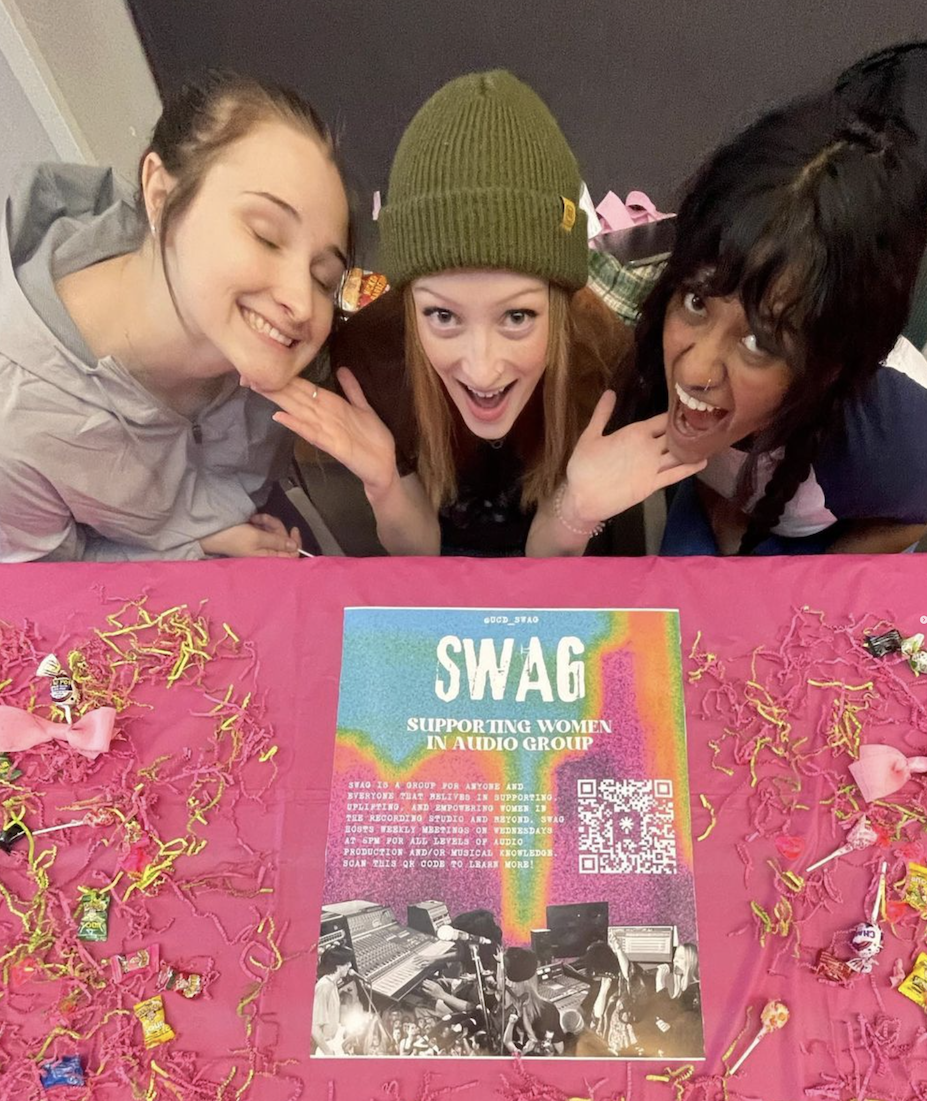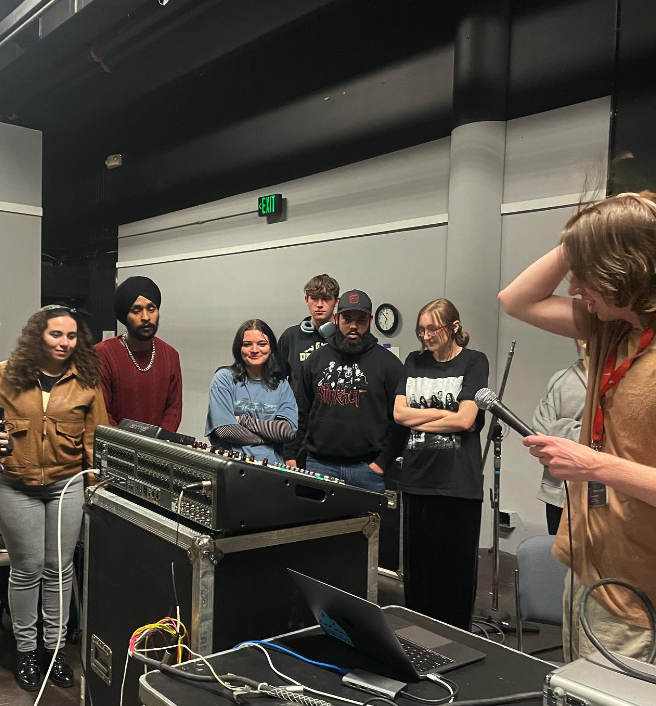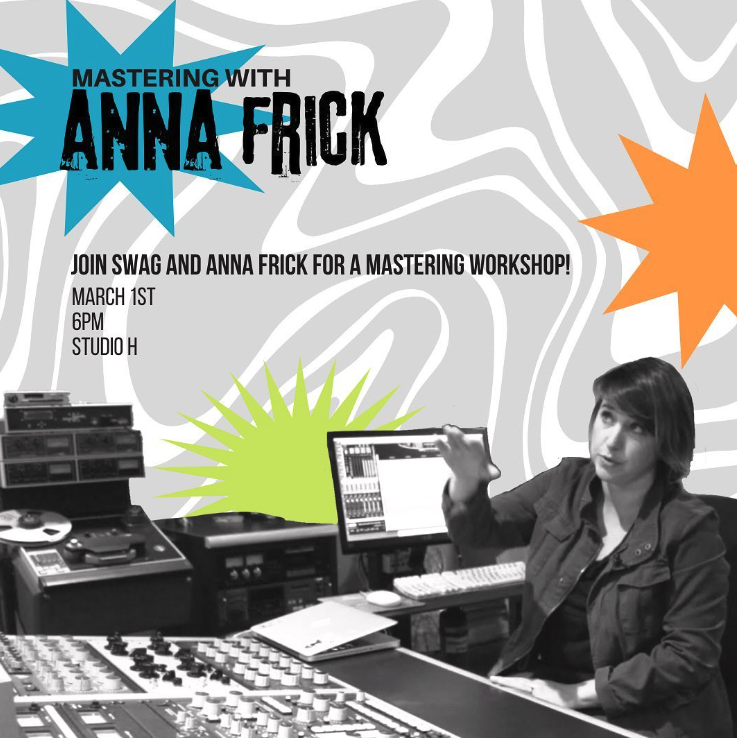The Students Behind Supporting Women in Audio Group Are Working to Change an Industry
Three students lean into the experience of female faculty to create an inclusive environment in the recording studio.
Megan Briggs Pintel | College of Arts & Media Mar 28, 2024
When College of Arts & Media (CAM) students Maithili Anantpur, Nikki Gorman, and GG Tyler stepped into their first recording arts class at CU Denver, the words totally comfortable could not be used to describe how they felt. While all three students were musically inclined, being in a recording studio felt intimidating. When the three met each other—the few female students in CU Denver’s recording arts program—they formed a friendship that would eventually help other recording arts students as well, in the form of a student organization they named SWAG (Supporting Women in Audio Group).
“I think it shows how dedicated we all are if we’re still at school at 8 o’clock at night taking notes. I never thought I’d be that into learning something,” GG says.
GG, Nikki, and Maithili formed SWAG last year. The group hosts informal, after-hours sessions in CAM’s Music & Entertainment Industry Studies (MEIS) Recording Core, located in the Arts Building on the Auraria Campus. They also invite guest speakers and fellow recording arts students to present workshops. The prevailing theme of their meetings is to help those interested in recording arts and all that entails (audio production, mastering, producing, sound engineering, sound for film, etc.) hone their skills behind a sound board.
Creating a Culture of Inclusivity
The group is not just for people who identify as women, either. Everyone who supports female voices is welcome. In fact, the whole point of the club is to create a non-intimidating space in the Recording Core where students of every stripe and persuasion feel comfortable to ask questions and learn from one another.

The leaders of SWAG have accomplished a level of inclusivity they are proud of. “It helps to have my friends—women beside me. If I can be in the studio and can learn; I can ask questions. I feel supported, I feel safe. I belong there. That’s something I never felt before,” GG says.
Part of the discomfort the three students originally felt came from a feeling of being behind. Nikki says, “Coming in, [the male students] seemed to have a lot of knowledge. And they had the lingo down.” Maithili, who started classes a little late her first semester, felt the same. All three students became interested in recording arts by way of music. Nikki and Maithili are singers who would like to be able to record and produce themselves and others. GG wanted to be a rock star when she was a kid—she recalls asking for a pink guitar for Christmas—but as she got older, recording arts seemed like a practical way to build a career around music. She was pleasantly surprised by how much she enjoyed the technical side of music production. After transferring from CU Boulder to CU Denver for the recording arts program, she feels she can take her affinity for STEM in a direction that accommodates her artistic side.
The students are aware that even while they work to create this safe and inclusive environment in school, what is waiting for them in the professional world will likely not be as inclusive. There aren’t a lot of role models for aspiring female audio engineers and producers. And those they look up have had to navigate more than their fair share of discrimination and underrepresentation.
The ratio of female-identifying to male-identifying students in the MEIS Recording Arts program at CU Denver is better than the industry average (approximately 20% of current Recording Arts students are female), but unfortunately the bar is pretty low. According to 2023 a study by Dr. Stacy L. Smith and the University of Southern California’s Annenberg Inclusion Initiative, women compose only 2.8% of the producers represented on the last eight years of Billboard’s Hot 100 Year-End Chart. Additionally, the problem is exacerbated among women of color: “Of the 50 women credited as producers across the 8-year sample, 13 or 26% were women of color.”

Last spring, recording arts lecturer and CAM alum Anna Frick ('03) presented a mastering workshop to SWAG. Frick shared some of her experiences as a woman in the industry. In a lot of spaces, when a woman walks into the studio, she is the only one there. A man will generally automatically be accepted into these spaces, but women must prove they have a right to be there—an extra hurdle to overcome and a blow to a person’s confidence, Frick explained.
Three Women Who Have Shaped CU Denver’s Recording Arts Program
Frick “had a really hard time” getting her foot in the door of the recording arts industry after she graduated from CU Denver. An audiobook recording company in Boulder gave her a break, which led to a job at a mastering studio where she gained enough experience (12 years-worth) to be able to launch her own business, Ally Sound, in 2022. Now, she sits in positions of leadership on a handful of influential organizations in the audio recording industry, including being the co-founder of the Colorado chapter of SoundGirls.org, an organization which seeks to empower young women who are interested in the audio industry. Frick is also involved in the International Bluegrass Music Association (IBMA), providing insight on their board of directors, DEI, and educational committees. Additionally, Frick is on the board of trustees for the Recording Academy, which is responsible for the Grammys, and serves as the Audio Engineering Society’s (AES) Colorado Section Vice Chair. These experiences have led Frick to be a subject matter expert, not only in mastering audio but also in navigating the industry as a professional. At CU Denver, Frick teaches the classes “Forging a Career in Audio Engineering”, which discusses networking and overcoming barriers to entry, and “Audio Restoration”, which she describes as more technical, and which teaches students about the history of recorded audio formats.
Jiayue Cecelia Wu is the director of CAM’s Master of Science in Recording Arts (MSRA) Program. In addition to teaching both undergraduate and graduate classes at CU Denver, Wu also serves in several leadership positions in the audio industry. She is the chairperson of the DEI Committee at AES; the Editor-in-Chief of The Society for Electro-Acoustic Music in the U.S.; and the board director-at-large at the International Computer Music Association. At CU Denver, Wu is an integral part of the recording program and mentors a lot of the graduate students in the MSRA program. She also is the faculty advisor for SWAG.
A mention of CU Denver’s recording arts program can hardly stand without also mentioning Leslie Gaston-Bird, a former tenured Professor at CU Denver and an alum of the MSRA program. Gaston-Bird served as the chair of MEIS during her 13-year tenure. She moved to the United Kingdom in 2018 and is currently pursuing a PhD from the University of Surrey's Institute of Sound Research in addition to running her own company, Mix Messiah Productions. During her time at CU Denver, Gaston-Bird started interviewing women in the audio industry and posting the interviews to a blog. This work eventually turned into a book, published in partnership with AES, titled Women in Audio. Earlier this year, Gaston-Bird was named the president-elect of AES. She will be the first African American president to lead the 76-year-old organization. Gaston-Bird often points to two faculty members in MEIS, Roy Pritts and Richard Sanders (both of whom have since passed away), who encouraged her earlier in her career to become involved in AES.
The sentiment behind women in the recording industry trying to gain ground can best be summed up by GG: “I don’t just want to be ‘good for a girl.’ I want to be good at what I do and the best option for the job.” With each club meeting and workshop SWAG provides, the group is helping ensure its members will be just that.